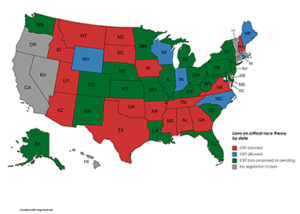By Cade Kennedy, Sports Editor
What is critical race theory? To some people, it is as the name suggests: a theory. But to others, it represents the indoctrination of children.
The debate around critical race theory reached the national stage in 2021 and has been a controversial topic of discussion since then. Debates about the theory quickly made their way to Oklahoma, as Gov. Kevin Stitt signed House Bill 1775 into law on May 7, 2021.

House Bill 1775 prohibits the teaching that one race is superior to another, that people are inherently racist or oppressive and that people bear responsibility for past actions committed by others of the same race or sex, among other stipulations. Opponents criticized the bill as being against critical race theory.
However, the bill never mentions critical race theory by name.
Oklahoma was not the only state to create a law seemingly banning critical race theory, as Texas, Florida, Georgia, Utah and other state governors have signed similar laws. Over the past two years, 44 state legislatures crafted bills to stop critical race theory from being taught in public schools.
LAW GOES INTO EFFECT
When the school year began in August 2022, 10th-grade students in Norman immediately saw the impact of House Bill 1775. As the students entered the classroom of English teacher Summer Boismier, they noticed a new addition to the classroom. A massive wall of red paper covered up the bookshelves, and a sign written in black read: “Books the state doesn’t want you to read.”
The sign also contained a QR code that, when scanned, gave students a link to the Brooklyn Public Library’s “Books Unbanned” program, which gave students access to books that may have stood in opposition to House Bill 1775.
On the first day of school, a parent complained about the sign, and four days later, Boismier resigned during what was her ninth year of teaching.
“I feel like I cannot do my job and follow that law at the same time,” Boismier said in an interview with The Oklahoman newspaper. “It puts teachers in an impossible position. It forces educators to commit educational malpractice in order to keep our jobs.”
Boismier had dozens of books that hid behind the red paper that students could read, but the new policy implemented by Norman Public Schools required teachers to verify that they read every book in their classroom or to provide two professional sources for each book to confirm it was appropriate for the classroom.
Boismier said the district’s policy would cause doubts about books written by LGBTQ and minority authors, which she said are critical for representing students.
“As far as ideology goes, I do believe the classroom is an inherently political space,” Boismier said in the interview. “I do not mean partisan. Speaking is political, but silence is also political. If I had no choice but to be political, I’m going to err on the side of compassion and inclusivity. I couldn’t promise the district that I wouldn’t do it again.”
Boismier was one of the first teachers to face the consequences of House Bill 1775, but Norman was not the first school to deal with the repercussions.
On July 28, 2022, the Oklahoma State Board of Education voted 4-2 to issue accreditation warnings to both Tulsa and Mustang Public Schools for violating House Bill 1775.
Oklahoma has five stages of accreditation, and by giving each school a warning, both Tulsa and Mustang moved from stage one – accreditation with no deficiencies – to stage four, which is accreditation with a warning. Despite the incident occurring at Tulsa Memorial High School, all 11 schools in the Tulsa Public School district received the warning.
In northwest Oklahoma, the situation is the opposite of what happened in Norman. At Freedom Public School, one of the smallest schools in the state, everything still feels the same. From the standards to the material taught, not much has changed, according to Grace Contrerez, the history teacher at Freedom.
“I haven’t felt any effects of critical race theory,” Contrerez said. “I still teach the same historical content, and the content standards have not changed since I’ve been teaching.”
WHAT DOES
THEORY STAND FOR?
According to Karlos Hill, the chair of the Clara Luper Department of African and African-American Studies at the University of Oklahoma, critical race theory is an academic theory that says race and racism are tied throughout American society. The theory started in law schools, and legal scholar Derrick Bell is often credited with creating the term in the 1970s.
“He made an argument about the enduring role that racism and racial discrimination has played in American institutional life, not just legal culture, but pervasive throughout American culture,” Hill said in an interview with The Black Wall Street Times newspaper.

Hill said the original theory is not being brought up in conversations, and the debate is being used by conservative lawmakers to rally their base and win elections.
“This critical race boogeyman, this manufactured polarization, is very effective in doing that, but it’s going to have long-term disastrous consequences,” Hill said in the interview.
Ryan Walters, the Oklahoma state superintendent of public instruction, has a different perspective about the theory.
According to Walters, critical race theory is a philosophy that only divides and characterizes entire groups of people solely based on the color of their skin. On Walters’ campaign website, he also says critical race theory is not only racist, but dangerous.
“When you’re telling students that because of the color of their skin they’re inferior or superior to another race, when you get into concepts that tell students they should be ashamed of their whiteness, all of that is ideology,” Walters said in an interview with The Oklahoman.
On Walters’ campaign website, he states that abolishing critical race theory is one of the main parts of his job as superintendent, as it is the first issue listed on the website.
“We will not allow the indoctrination of Oklahoma students here in the state of Oklahoma, and I as the state superintendent and the Department of Education will do everything within our power to not allow our kids to be indoctrinated by far-left radicals and to hold those accountable who have done so,” he said.

